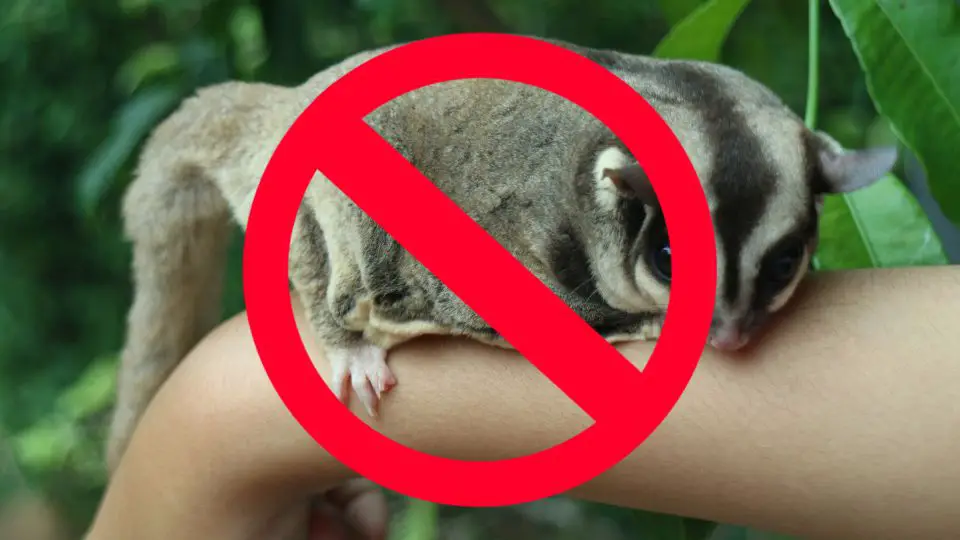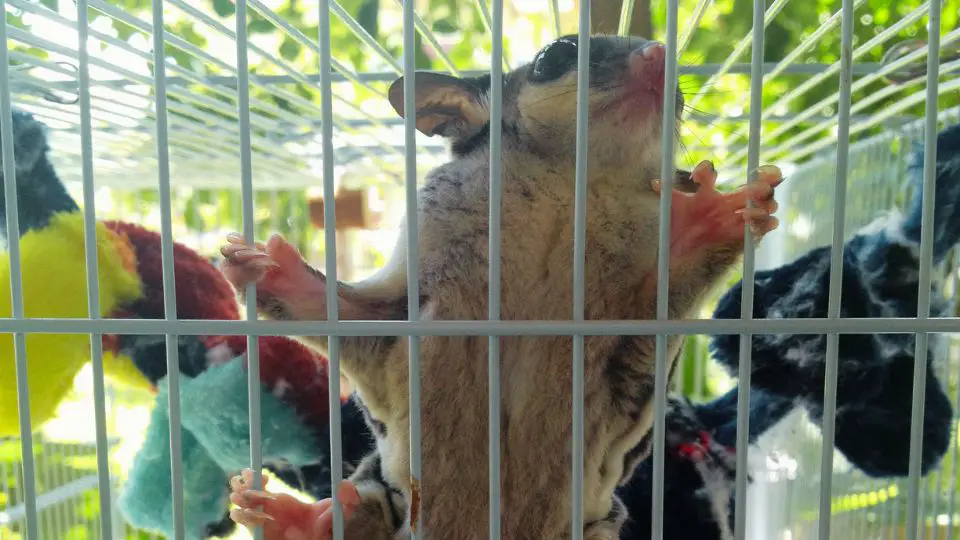It is possible to train sugar gliders to stop biting, but it may take some time and patience. There are a few things you can do to help discourage biting, such as offering food rewards for good behavior, providing toys and playtime, and establishing rules and consequences for biting.
With consistency and positive reinforcement, your sugar glider can learn to stop biting. In this article, we talk about why does your sugar glider bites you and how to train your pet glider to stop.
Do sugar gliders bite?
It’s natural for sugar gliders to want to bite. They are wild animals, after all. In the wild, they use their sharp teeth to defend themselves from predators and grab their food.
But just because biting is natural for sugar gliders doesn’t mean that it’s something you have to tolerate. If your sugar glider is biting you, it’s important to take steps to train them to stop.
The good news is that sugar gliders can be trained not to bite. With patience and consistency, you can teach your sugar glider that biting is not acceptable behavior.
How bad does it hurt when a sugar glider bites
The level of pain you feel when a sugar glider bites you depends on how hard they bite, where they bite you and your tolerance to pain. Sugar gliders have sharp teeth that can puncture skin. If they bite you hard enough, they can even leave a bleeding wound behind (not more than a few drops, of course).
Of course, the opposite applies too: they can nibble on your skin, which is meant to show affection.
In general, sugar glider bites are not dangerous or life-threatening. However, they can be pretty painful. If you have a sugar glider that bites you frequently, it’s important to take steps to stop the biting behavior.
Is sugar glider bite harmful for humans?
No, sugar glider bites are not harmful for humans. However, they can be painful. If you have a sugar glider that bites you frequently, it’s important to take steps to stop the biting behavior.
Why does my sugar glider bite?
They’re scared
Sugar gliders are wild animals. In the wild, they use their sharp teeth to defend themselves from predators and grab their food. If your sugar glider feels scared or threatened, they might bite you in self-defense.
They’re playful
If you have a young sugar glider, they might bite you while they’re playing. Sugar gliders are very active and playful creatures, and their playful bites are often harmless.
They’re trying to communicate
Sugar gliders are very vocal animals. They use a variety of sounds and body language to communicate with each other. If your sugar glider is trying to tell you something and you’re not understanding, they might bite you to get your attention.
They’re showing affection
In some cases, sugar gliders will nibble on your skin as a way to show affection. This is usually not a painful bite, and it’s usually done in a gentle way.
However, if your sugar glider bites you too hard while they’re trying to show affection, it can be painful.
They are in pain
If your sugar glider is in pain, they might bite you. Sugar gliders are very good at hiding their pain, so it’s important to watch for other signs that they’re not feeling well too. If you think your sugar glider is in pain, take them to the vet right away.
They’re getting used with their teeth
Sugar gliders already have all their teeth when they get out of the pouch. They do, however, go through a “teenage phase” while still young, when they bite everything for no reason, getting used to their teeth.
They’re hungry
If your sugar glider is hungry, they might bite you to get your attention. Sugar gliders are nocturnal animals, so they’re most active at night. If you’re trying to sleep while they’re awake and active, they might bite you to let you know that they want food.
They Don’t Recognize Your Scent
When sugar gliders are first born, they’re only able to see in black and white. After about two weeks, their eyes start to open and they can begin to see colors. However, it takes a few more weeks for their vision to fully develop. During this time, they rely heavily on their sense of smell to identify their mother and other members of their colony.
If you’re holding a baby sugar glider, they might bite you because they don’t recognize your scent.
A major step in avoiding being bit because of not recognizable scent is making sure you’re not wearing perfume or carrying other cosmetics or chemicals scent when handling sugar gliders.
They’re stressed
Sugar gliders can get stressed out for a variety of reasons. If your sugar glider is stressed, they might bite you. Some common causes of stress in sugar gliders include:
- Lack of social interaction
- Lack of exercise
- Poor diet
- Being too hot or too cold
- Loud noises
- Changes in their environment
Show dominance
Sugar gliders are very territorial creatures. If they feel like their territory is being threatened, they might bite you to show you that it’s theirs. This is especially common if you have more than one sugar glider.
They are grooming you
In the wild, sugar gliders groom each other as a way to bond and show affection. If your sugar glider starts grooming you, it’s a good sign that they trust you and see you as part of their colony.
In captivity, sugar gliders can often get to groom their owners. This consists of them scratching their teeth on their owner’s skin and it is not painful.
It may seem like a strange activity, but trust us, it’s a bonding experience for both the sugar glider and the owner. Gliders will often groom their owners as a way of showing affection and establishing trust. It can be quite a soothing experience, and many owners report feeling close to their gliders after being groomed.
How to train your sugar glider to stop biting
Here are some tips for how to train a sugar glider to stop biting:
- Establish trust and bond with your sugar glider. Spend time interacting with them every day, such as playing games, letting them crawl on you, and offering them treats. The more time you spend together, the more they’ll learn to trust you.
- Never punish your sugar glider for biting. This will only make them more scared of you and less likely to trust you. You must accept the bite.
- If your sugar glider bites you, calmly say “no” but do not change your place, do not get away from them. Watch them directly in their eyes when talking to them. Do not act on it afterwards, as it can eventually teach the sugar glider he can make you act in a certain way (such as going away) if they bit you, hence making them the trainer instead of the trainee.
- Offer your sugar glider chew toys to gnaw on instead of biting you. This will help them get rid of their urge to bite and give them something to do with their mouth.
- Make sure your sugar glider has plenty of opportunities to socialize and exercise. A lack of interaction or exercise can lead to boredom and stress, which can cause them to bite.
- Keep in mind that biting is a basic behavior of sugar gliders and cannot be taken away from them for good. The best option is to distract the sugar glider from doing it.
- Distract your sugar glider from biting by offering him a treat.
- Gently blow air on the back of their heads. They won’t like it, and as a response, usually they stop biting.
- “Pssst” sound instead of blowing air can work on some sugar gliders as well. Try it as it can be as effective as the air blowing, but not as unpleasant for your sugar glider.
- Use licky treats (such as apple sauce). Spread them where sugar gliders often go for biting. After enough repetition, they will turn the biting habit into a licking one.
With patience and consistency, you can train your sugar glider to stop biting. Just remember to never punish them for biting, as this will only make the problem worse. Instead, focus on building trust and bond with your sugar glider, so they see you as a friend, not a threat.
How to bond with an aggressive sugar glider
If your sugar glider is being aggressive and difficult to bond with, you may need to take some extra steps to make sure they feel comfortable and safe around you. One way to do this is to offer them food that they really love. Try offering them a small piece of fruit or a special treat that they can’t get enough of. Once they start trusting you and feeling comfortable around you, they will be more likely to let you handle them.
You can also try to pet the sugar glider’s back. This will make the sugar glider feel comfortable around you.
Next, try to approach him slowly and calmly, and avoid making sudden movements. If he starts to become agitated, back off and give it some space. Once it’s feeling more comfortable, you can start to pet it and offer treats. It may take a while for the sugar glider to trust you fully, but with patience and persistence, you should be able to form a strong bond.
If he keeps being aggressive, the best course of action is to give him a break of at least several days before trying again. During these days, it would be best to spend time near his cage, talking to him calmly. You can discover that singing lullabies works too.
Conclusion
If you want to train your sugar glider to stop biting, you’ll need to be patient and consistent. Offering chew toys, treats, and spending time together can help build trust and bond between you and your sugar glider. If the sugar glider is feeling aggressive, try offering a favorite food or petting the back to make them feel comfortable around you. Remember to take breaks if the sugar glider gets too agitated, and eventually you should be able to form a strong bond.







